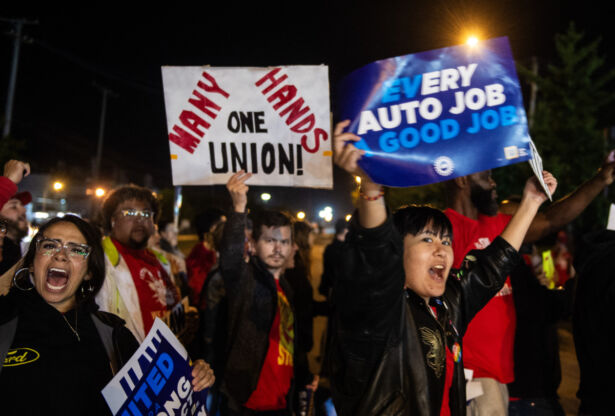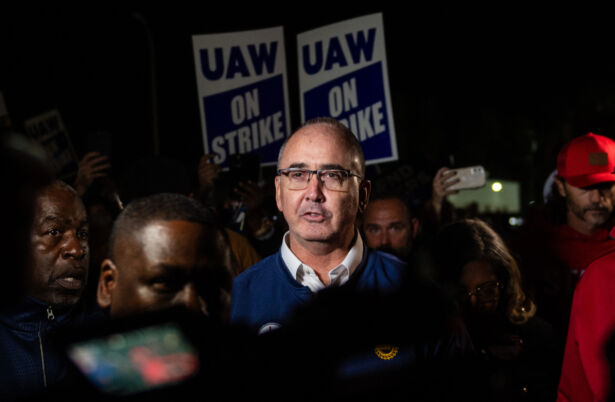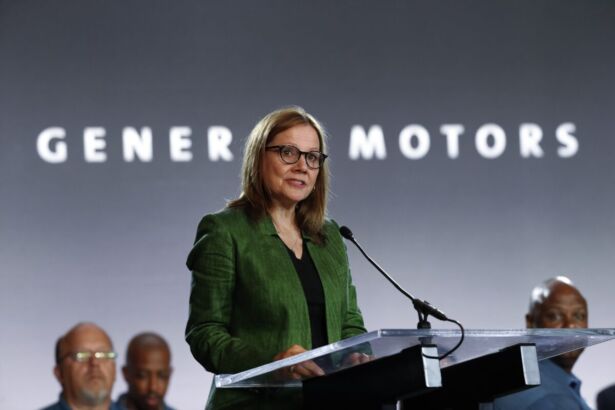United Auto Workers (UAW) union members have gone on strike against the three biggest automakers for the first time in history after failing to reach a deal on a new labor contract by the 11:59 p.m. Sept. 14 deadline.
Despite weeks of negotiations, the union was unable to come to an agreement over contract negotiations with General Motors, Ford, and Stellantis—known as the big three—before current contracts expired, prompting thousands of its members to walk out of three factories across the country in Missouri, Michigan, and Ohio.
The strikes are taking place at Ford’s Bronco assembly plant in Wayne, Michigan, GM’s mid-sized pickup truck assembly plant in Wentzville, Missouri, and Stellantis’s Jeep assembly plant in Toledo, Ohio.
It is unclear how long the strikes will last, however UAW—the largest union in the nation—has an $825 million strike fund that will compensate workers $500 a week while out on strike.
Video footage shared online showed some of the strikes began promptly after midnight, with dozens of workers taking to the streets and holding posters stating “end tiers” and “record profits, record contracts,” and chanting in support of the strikes and higher pay.

“This fight is our generation’s defining moment,” UAW said in a press release announcing the strike late Thursday. “Not just at the Big Three, but across the entire working class. We will stand up for ourselves. We will stand up for our families. We will stand up for our communities.”
UAW represents some 150,000 workers at General Motors, Ford, and Stellantis, however approximately 12,700 workers will be taking part in the strike, UAW President Shawn Fain said at a press conference Thursday night; 3,600 at GM, 3,300 at Ford, and 5,800 at Stellantis.
“Leading into the final hours of the strike deadline, we’ve been working hard trying to reach a deal for economic and social justice for our members. We have been firm. We are committed to winning an agreement with the big three that reflects the incredible sacrifice and contributions UAW members have made to these companies,” Mr. Fain said.
The strikes are expected to have significant business and economic implications. According to Anderson Economic Group (AEG), a work stoppage of 10 days could result in a total economic loss of more than $5 billion. The strike also has the potential to lead to higher car prices amid lower inventories, according to AEG.
Strikes Will Have ‘Wide-Ranging Consequences’
Meanwhile, the plants involved in the strikes are also critical to the three automakers’ productions. Some of their most profitable vehicles include the Ford Bronco, Jeep Wrangler, and Chevrolet Colorado pickup truck.
A full strike at each of the automakers could see losses of around $400 million to $500 million per week assuming all production was lost, Deutsche Bank has estimated.
Despite weeks of negotiations, union members and the big three have failed to reach an agreement over pay, enhanced benefits, and pensions.

The union has proposed a four-year contract with 40 percent pay increases, a reduced 32-hour work week, the elimination of compensation tiers, a restoration of cost-of-living adjustments, and the restoration of traditional pensions, among other items.
The automakers, which have all recorded record or near-record profits, have so far declined to meet that rise, instead offering 20 percent without key benefits demanded by the union, citing concerns that such pay hikes could effectively put them out of business.
Hours before the deadline passed, Ford said it had bargained “in good faith” in an effort to avoid a strike, which the company said “could have wide-ranging consequences for our business and the economy.”
The company said the last offer it submitted to the union was “historically generous, with large wage increases, cost of living adjustments, more paid time off, additional retirement contributions, and more.”
“Unfortunately, the UAW’s counterproposal tonight showed little movement from the union’s initial demands submitted Aug. 3. If implemented, the proposal would more than double Ford’s current UAW-related labor costs, which are already significantly higher than the labor costs of Tesla, Toyota, and other foreign-owned automakers in the United States that utilize non-union-represented labor,” the company said.
Ford said it remains “absolutely committed to reaching an agreement that rewards our employees and protects Ford’s ability to invest in the future as we move through industry-wide transformation.”

Union Prepared to ‘Go All Out’
General Motors said it was “disappointed by the UAW leadership’s actions.”
“Despite the unprecedented economic package GM put on the table, including historic wage increases and manufacturing commitments. We will continue to bargain in good faith with the union to reach an agreement as quickly as possible for the benefit of our team members, customers, suppliers, and communities across the U.S. In the meantime, our priority is the safety of our workforce,” the automaker said in a statement Thursday.
Stellantis has not yet commented on the strikes. The Epoch Times has contacted a Stellantis spokesperson for comment.
The “stand-up strikes”—effectively staggered strikes across the various automakers’ factories—are a nod to the historic “sit-down” strikes UAW members held in the 1930s, and avoid a full walkout.
UAW President Mr. Fain said during Thursday’s press conference that the strategy will “keep the companies guessing,” and give its national negotiators “maximum leverage and flexibility in bargaining.”
However, Mr. Fain warned that the UAW will go “all out” if it needs to, adding that “everything is on the table.”
He also clarified that workers who have not yet been called to join the strike will continue to work under the expired contract.
Speaking to reporters outside the Ford facility in Wayne minutes after the strike began Thursday, the union head criticized the three companies for allegedly failing to negotiate in good faith.
“They waited until the last week to want to get down to business, shame on them,” he said. Mr. Fain also said he believes it is a complete “joke” that the companies have suggested the strikes may bankrupt them.
“The cost of labor that goes into a vehicle is 5 percent of the vehicle, they could double our wages and they could not raise the price of vehicles and they could still make billions of dollars, it is a lie like everything else that comes out of their mouths.”
The union head also hinted that more strikes could take place at further facilities if the three companies are unable to meet the union’s demands.
The last time there was a UAW strike was in 2019 when the union went on strike for six weeks against General Motors. It cost the automaker $3.6 billion.
From The Epoch Times
